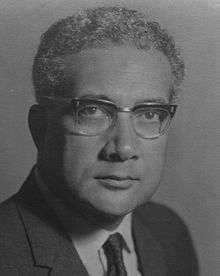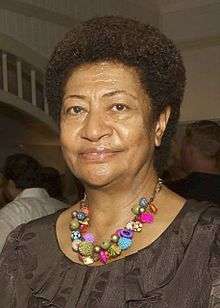Leader of the Opposition (Fiji)
| Leader of the Opposition | |
|---|---|
|
Logo of the largest opposition party | |
|
Incumbent Ro Teimumu Kepa since 07 October 2016 | |
| Term length | While leader of the largest political party not in government |
 |
| This article is part of a series on the politics and government of Fiji |
|
Legislative
|
|
Judiciary |
|
The post of Leader of the Opposition is a political office common in countries that are part of the Commonwealth of Nations. It did not originate in Fiji but has a long tradition; in British constitutional theory, the Leader of the Opposition must pose a formal alternative to the government, ready to form a government himself should the Prime Minister lose the confidence of the Parliament.
Description of the office
The Leader of the Opposition is chosen by a vote of all members of Parliament who declare that they do not support the government. But before the adoption of the 2013 Constitution, the Leader of the Opposition was formally appointed by the President. The appointment was not at the president's personal discretion, however, as he was required by the Constitution to appoint the person most acceptable to the majority of the Opposition (defined as members of the House of Representatives who belong to political parties not represented in the Cabinet). In theory, that meant the parliamentary leader of the largest Opposition party. In practice, the person most eligible could decline the office, as was the case between 2001 and 2004, when Mahendra Chaudhry, whose Labour Party held 28 of the 30 Opposition seats in the House of Representatives, adamantly refused to accept the position of Leader of the Opposition, insisting that he and his party wanted representation in the Cabinet instead. Until he reversed his position late in 2004 (following the collapse of negotiations with Prime Minister Qarase), this forced the President to appoint Mick Beddoes, the sole parliamentary representative of the United General Party, as Leader of the Opposition.
Under the 1997 Constitution, the Leader of the Opposition chose 8 of the 32 members of the Senate, Fiji's upper house of Parliament, and had the right to be consulted about the appointment of the Chief Justice.
List of Leaders of the Opposition in Fiji (1970–present)
| No. | Portrait | Leader (Birth–Death) |
Political Party | Term of office |
|---|---|---|---|---|
| 1 |  |
Sidiq M. Koya (1924–1993) |
National Federation Party | 1970–1977 |
| 2 |  |
Jai Ram Reddy (1937–) |
National Federation Party | 1977–1984 |
| (1) |  |
Sidiq M. Koya (1924–1993) |
National Federation Party | 1984–1987 |
| 3 |  |
Harish Sharma (1932–) |
National Federation Party | 1987 |
| 4 |  |
Ratu Sir Kamisese Mara (1920–2004) |
Alliance Party | 1987 |
| vacant | 1987–1992 | |||
| (2) |  |
Jai Ram Reddy (1937–) |
National Federation Party | 1992–1999 |
| 5 |  |
Ratu Inoke Kubuabola (1948–) |
Fijian Political Party | 1999–2000 |
| vacant | 2000–2001 | |||
| 6 |  |
Prem Singh | National Federation Party | 2001–2002 |
| 7 |  |
Millis Malcolm (Mick) Beddoes | United General Party[nb 1] | 2002–2004 |
| 8 |  |
Mahendra Chaudhry (1942–) |
Fiji Labour Party | 2004–2006 |
| (7) |  |
Millis Malcolm (Mick) Beddoes | United Peoples Party | 2006 |
| vacant | 2006–2014 | |||
| 9 |  |
Ro Teimumu Kepa (1945–) |
Social Democratic Liberal Party | 2014–present |
See also
References
- Notes
- ↑ The United General Party was renamed the United People's Party in 2004.
- Footnotes
